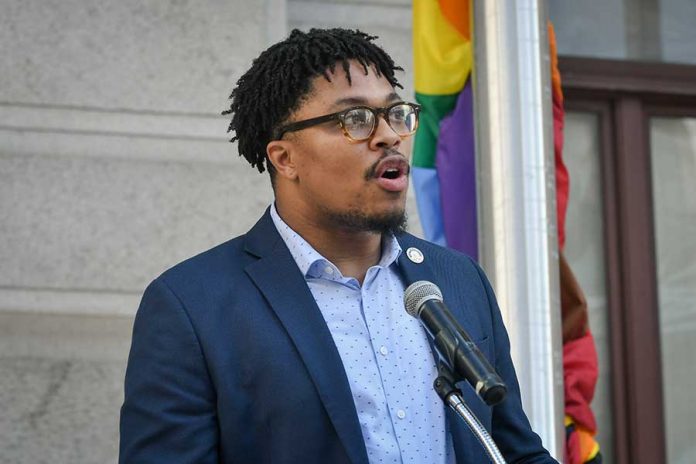Pennsylvania Rep. Malcolm Kenyatta recently introduced a co-sponsorship memo for a forthcoming bill requiring all state forms that collect demographic information to provide an optional LGBTQ+ identification question. According to Kenyatta, an increase in data will facilitate state-level proposals and the implementation of more robust resources for LGBTQ communities in Pennsylvania.
Kenyatta cites in his memo the need for resources to combat problems related to discrimination, substance abuse, mental health disorders and other issues that LGBTQ individuals face. He believes the acquisition of more accurate LGBTQ data is the key to achieving such resources.
“There is an important movement brewing right now, which I think Pennsylvania needs to be a part of, which is around data justice,” Kenyatta said.
“If you don’t know where it hurts then we’ll never be able to solve the problems that exist for folks. We actually know almost nothing about the LGBT community from [state and federal] government data. We diminish our ability to adequately send funds, to address the critical needs — be it healthcare, housing, education — for all of our families when we don’t have grounded data that helps us make decisions.”
Fourteen other members of the Pennsylvania General Assembly have co-sponsored Kenyatta’s forthcoming bill, including Rep. Christopher M. Rabb, who represents Philadelphia County.
“I think [the bill] is a step in the right direction,” Rabb said.
“We have a state legislature that is dominated by people who do not honor the full humanity of people — [those] who do not identify as hetero, who do not ascribe to binary gender identity, for folks who identify as queer. Those folks need protection; they need care; they need respect and under full force of the law. That is not the case in Pennsylvania right now.”
There is currently no law in Pennsylvania protecting LGBTQ people from discrimination in public accommodations. Pennsylvania is the only northeastern U.S. state in which such legislation does not exist. Democratic leaders and activists have been steadily trying to pass comprehensive nondiscrimination legislation, known as the Fairness Act, to add sexual orientation, gender identity and gender expression to Pennsylvania’s current nondiscrimination law, originally drawn up in 1955.
“I also believe that this is not a ‘gay rights issue,’ this is a human rights issue,” Rabb said. “That means that anyone who believes in liberty and justice for all, then they should be supporting legislation like this. That means that everyone, even if you do not identify as LGBTQ, for those of us who are accomplices, we have a responsibility to speak up.”
Kenyatta too acknowledged the urgent need to pass nondiscrimination legislation in Pennsylvania, but that the state first needs to collect more accurate data on LGBTQ populations.
“We have to get nondiscrimination passed, but we also need to know in more granular detail the amount of folks that are impacted by us not having something like nondiscrimination,” he said.
The Trevor Project, an organization that provides crisis intervention and suicide prevention to LGBTQ youth, is one supporter of Kenyatta’s forthcoming bill. The organization has been doing work surrounding data justice for LGBTQ people, and fought to include an LGBTQ-related question on the U.S. Census, to no avail, Kenyatta explained.
“This was the impetus for me frankly, to say if the federal government is going to continue to ignore us, and we saw with the Trump administration actively try to stop the collection of, remove the links to and distort data around the LGBT community,” Kenyatta said. “Pennsylvania has to be at the forefront of protecting these families.”
The National Alliance on Mental Illness reports that LGB adults are more than twice as likely as straight adults to experience a mental health condition in their lifetime. LGBTQ people are at higher risk of experiencing suicidal thoughts and attempting suicide than the population at large.
According to a 2017 report by the American Psychiatric Association, LGBTQ people are two and a half times as likely to experience depression, anxiety and substance abuse compared to straight and/or cisgender people. It also reports that transgender people who are Black, African American, Hispanic, Latinx, American Indian/Alaskan Native or multiracial are at a higher risk of attempting suicide than their white trans peers.
Thomas Ude Jr., legal and public policy director at Mazzoni Center, believes that this potential increase in LGBTQ data, and subsequent resources, would be of interest to the center and be an asset to LGBTQ communities.
“I think it would provide helpful information and also make the LGBTQ community less invisible,” Ude said. “Right now the demographics that are collected by Pennsylvania and many other states, there’s just no way to know how many people identify as LGBTQ. Even with a question that’s voluntary, it would provide additional information that would be useful.”
In a press conference to take place in Harrisburg on March 25, Kenyatta will introduce this legislation and discuss the larger conversation surrounding data justice as related to LGBTQ communities. He hopes to gain the support of other organizations such as the Human Rights Campaign and PFLAG in order to pass the bill.
